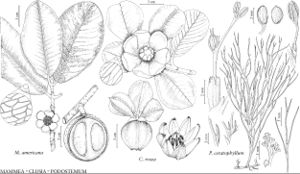Podostemaceae
Herbs, [annual] perennial, aquatic, attached to rocks and other solid substrata in rapids and waterfalls, submersed in vegetative stage, becoming reproductive as water level drops, exposing plants to air. Roots prostrate, elongate, root cap asymmetric. Stems often trailing in connate basally; stamens [1–]2[–many], [1–2-whorled or incompletely 1-whorled] restricted to 1 side of flower; filaments arising from andropodium [individually, not from andropodium], distinct or connate basally; ovary 2[or 3]-carpellate; stigmas 2[or 3], apical. Fruits capsular, 2-valved [3-valved in Tristicha], [valves persistent] 1 valve falling away after dehiscence. Seeds 0–40[–numerous] per capsule, orange-brown, minute, ovoid, outer integument expanded and sticky when wet.
Distribution
c, e North America, Mexico, West Indies, Central America, South America, Africa, se Asia, India, n Australia, pantropical.
Discussion
Genera ca. 50, species ca. 260 (1 in the flora).
Molecular evidence indicates that Podostemaceae is related to Clusiaceae within the Malpighiales (M. H. G. Gustafsson et al. 2002). Structural modifications of vegetative features has led to controversy regarding how best to interpret the structural categories of root, shoot, and leaf in Podostemaceae (for example, I. Jäger-Zürn 2005; R. Rutishauser 1997).
